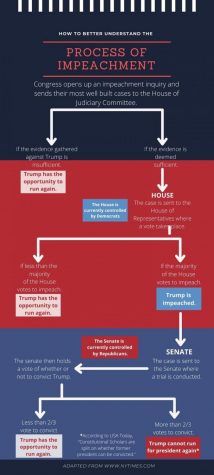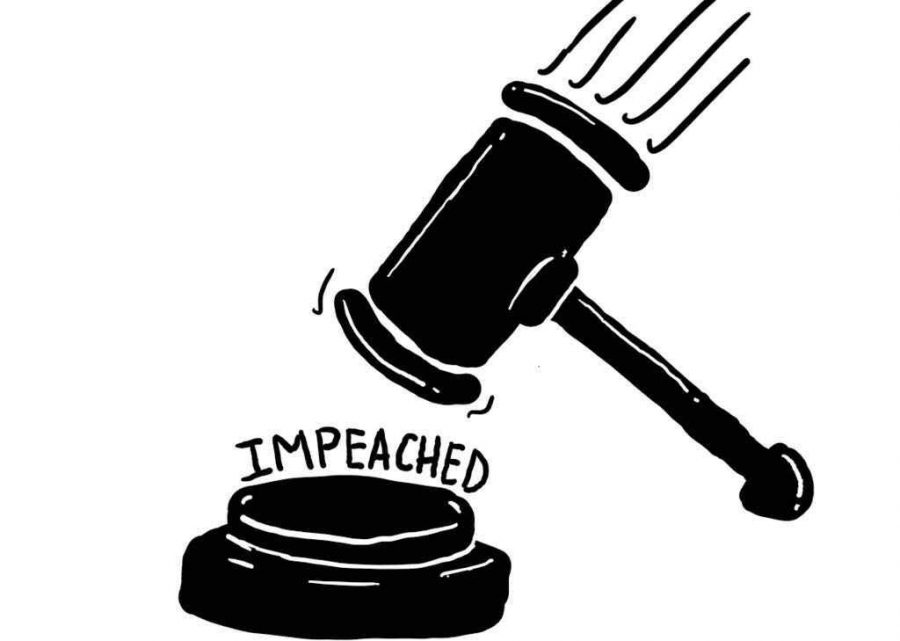Impeached…again? What Trump’s second impeachment means for American history
Depiction of a judge’s gavel coming down to an impeachment verdict.
On Wednesday, Jan. 13, Speaker of the House of Representatives Nancy Pelosi signed the Article of Impeachment against former President Donald Trump. The House of Representatives voted on impeachment following the assault at the United States Capitol building on Jan. 6, charging President Trump with “incitement of insurrection.”
On Jan. 6, President Trump delivered a 70-minute speech to his supporters falsely accusing Congress of a stolen election and encouraging his supporters to claim the election as theirs, with phrases like “If you don’t fight like Hell, you’re not going to have a country anymore.” The insurrection resulted in the death of a woman as the mob breached the building, and the entire DC National Guard was called in. In addition, there was a citywide curfew for 12 hours after the insurrection.
Because President Trump is the third president to be impeached, the process of impeachment and the possibility of removal from office is shocking to many within our community.

Article II, Section 4 of the United States Constitution states, “the President, Vice President and all civil Officers of the United States, shall be removed from Office on Impeachment for, and Conviction of, Treason, Bribery, or other high Crimes and Misdemeanors.”
The charge of incitement of insurrection against Trump falls into the “high crimes and misdemeanors” category, according to the New York Times.
“The term came out of the British common law tradition: it was the sort of offense that Parliament cited in removing crown officials for centuries,” the New York Times article said.
The first president of the United States to be impeached was the 17th president, Andrew Johnson. In 1867, the Radical Republicans (a faction within the Republican Party) sought to pass the Tenure of Office Act, which would limit the president’s ability to form a cabinet to only benefit themself. The reason behind Johnson’s impeachment came mostly from his direct opposition to this act. In conclusion, Johnson was never removed from office because enough votes were in favor of him remaining President.
The current situation regarding President Trump varies from President Johnson’s circumstances because Trump no longer holds office in the White House.
Ever since Jan. 8, 1828, the United States has been impacted by the division between the Republican and Democratic political parties. This division has created extreme conflict throughout U.S. history from Andrew Johnson’s impeachment to the impeachment of President Trump.
This is the second time President Trump has been impeached without being removed from office. He is also the first U.S. president to have ever been impeached more than once.
The Senate impeachment trials are set to start the week of Feb. 8. Currently, Republicans and Democrats each hold 50 seats in the Senate.This means there is equal power between the parties. In order for President Trump to be impeached, 17 Republican senators would have to vote against their own party.
If these 17 Republican senators vote in favor of impeachment, President Trump will be convicted. A possible consequence for the former President include not being able to run in the 2024 presidential election. One other possible outcome would remove President Trump’s health insurance, pension and private security. Although the removal of these benefits are possible, it is unlikely that they will be removed because President Trump has left office.
While there are varying arguments at every angle, the fate of President Trump will be decided by the Senate on the week of Feb. 8.

Avery is a senior, starting her second year in journalism. She enjoys hikes with her family, spending time with her friends, being at the beach, and driving...







